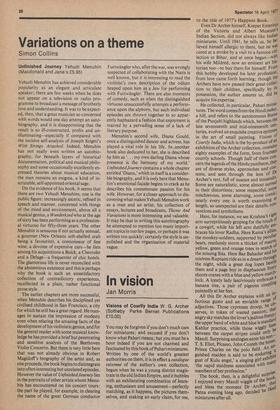Variations on a theme
Simon Collins
Unfinished Journey Yehudi Menuhin (Macdonald and Jane's £5.95)
Yehudi Menuhin has achieved considerable popularity as an elegant and articulate speaker; there are few weeks when he does not appear on a television or radio programme to broadcast a message of brotherly love and understanding. It was to be expected, then, that a great musician so concerned with words would one day attempt an autobiography, and it is disappointing that the result is so ill-constructed, prolix and unilluminating—especially if compared with the incisive self-analysis of Joseph Szigeti's With Strings Attached. Indeed, Menuhin has not really even written an autobiography, for beneath layers of historical documentation, political and musical philosophy and some occasionally excellently expressed theories about musical education, the man remains an enigma, a kind of inscrutable, self-appointed oriental sage.
On the evidence of his book, it seems that there are two Yehudi Menuhins, one is the public figure: increasingly ascetic, refined in speech and manner, concerned with things of the mind and environment, above all a musical genius, a Wunderkind who at the age of sixty has been performing as a professional virtuoso for fifty-three years. The other Menuhin is sensuous if not actually sensual, a gourmet (New Orleans soft-shelled crab being a favourite), a connoisseur of fine wine, a devotee of expensive cars—he lists among his acquisitions a Buick, a Chevrolet and a Delage—a frequenter of chic hotels. The glamorous life is never reconciled with the abstemious existence and this is perhaps why the book is such an unsatisfactory collection of contradictory experiences, recollected in a plain, rather functional prose style.
The earlier chapters are more successful, when Menuhin describes his disciplined yet civilised childhood in San Francisco, a city for which he still has a great regard. He manages to sustain the impression of modesty even when relating the amazing facts of the development of his violinistic genius, and for the general reader with some musical knowledge he has provided a brief but penetrating and sensitive analysis of the Beethoven Violin Concerto. But there is very little here that was not already obvious in Robert Magidoff's biography of the artist and, as one proceeds, the book begins to disintegrate into often interesting but unrelated episodes. However the value of Unfinished Journey lies in the portraits of other artists whom Menuhin has encountered on his concert tours: the part he played, for example, in clearing the name of the great German conductor
Furtwangler who, after the war, was wrongly suspected of collaborating with the Nazis is well known, but it is interesting to read the violinist's own description of the odium heaped upon him as a Jew for performing with Furtwangler. There are also moments of comedy, such as when the distinguished virtuoso unsuccessfully attempts a performance upon the alphorn, but such individual episodes are thrown together in so apparently haphazard a fashion that enjoyment is marred by a pervading sense of a lack of literary purpose.
Menuhin's second wife, Diana Gould, once a distinguished dancer and actress, has played a vital role in his life. In ,another book also dedicated to her, she is described by him as '. . . my own darling Diana whose presence is the harmony of my world.' Unfinished Journey contains a whole chapter entitled 'Diana,' which in itself is a considerble biography, and it is only here that Menuh in's emotional facade begins to crack as he describes his consummate passion for his wife. However, for a closer approach to discovering what makes Yehudi Menuhin work as a man and an artist, his collection of essays, lectures and broadcasts, Theme And Variations is more interesting and valuable. It may be that in writing this autobiography he attempted to mention too many important topics in too few pages, or perhaps it was written too quickly; certainly the style is unpolished and the organisation of material vague.






































 Previous page
Previous page